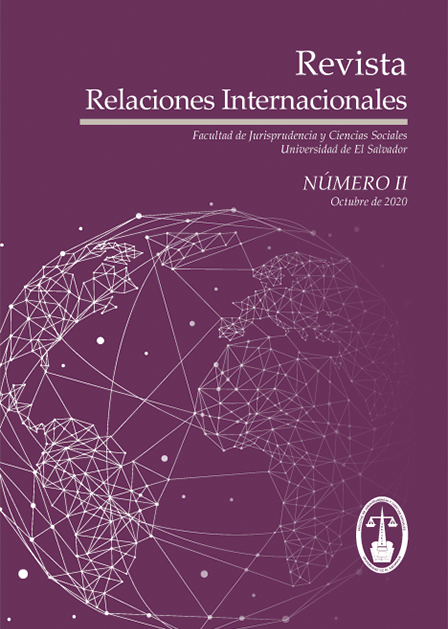Impact of Japanese migration in Brazil-Japan commercial relations
Keywords:
Brazil - Japan, Migration, Commercial Relations, Social Capital TheoryAbstract
The main objective of this essay is to explain the impact that Japanese migration has had on the development and evolution of commercial, investment and cooperation relations between Brazil and Japan. To that end, this work uses as a basis the social capital theory, which argues that social networks enable cooperation among individuals who pursuing a common goal, for which values such as trust and reciprocity norms are fundamental. In this regard, the main question to be resolved in this study is the following: What role did Japanese migration play in the establishing and development of commercial relations between Brazil and Japan?
To answer this question, this essay makes a historical review analyzing the moment in which Japanese migrations began to Brazil, encouraged to a large extent by the Japanese government as part of its development strategy. Likewise, this paper analyzes the process by which the establishment and formation of networks of Japanese immigrants in Brazil took place, who settled in that country integrating into its society until their subsequent emigration to Japan, decades later. This process eventually contributed to the consolidation of trade, cooperation and investment relations between Brazil and Japan. In the same way, this last fact was essential for the consolidation of the social capital and relations between both countries, in a process that has been fundamental for the development of both economies, constituting a diplomatic and economic policy of vital importance.
Downloads
References
Arlinda Nogueira, «Japanese immigration in Brazil». Diogenes, No 48 (2000): 45-55. http://www.cenb.org.br/articles/display_pt/207
Centro de Estudos Brasileros. Os Migrantes Japoneses e suas Familias no Brasil. Disponible en http://www.cenb.org.br/articles/display_pt/207 Última visita 15/5/2017.
César Ross, «La política exterior japonesa hacia América Latina y el Caribe: Entre la cooperación y los negocios». Atenea (Concepción), No 505 (2012): 185-217.
Gil Epstein y Odelia Heizler, «The Formation of Networks in the Diaspora». International Journal of Manpower, No 37 (2016): 1136-1153.
Henri Delanghe, «The Origin of Significant Japanese-Brazilian Trade and Investment Relations: Origin, Content and Consequences of the 1935 Japanese Trade Mission to Brazil». Center of Economic Studies Discussion Paper Series, 99, 1999. | Nogueira, «Japanese…,45. | Endoh, Exporting…, 4
Julia Hauberer, Social Capital Theory: Towards a Methodological Foundation (Springer Fachmedien Wiesbaden GmbH. VS Verlag für sozialwissenschaften, 2011).
Kiyoshi Harada, Comercio Exterior entre Japón y América Latina. (Harada Advogados, 2017) Palestras.
Koji Sasaki, Between Emigration and Immigration: Japanese Emigrants to Brazil and Their Descendants in Japan. Universidad de Tokyo. Yamashita et al., eds. Transnational Migration in East Asia. (Senri Ethnological Reports, 2008).
Ministério de Relaciones Exteriores de Brasil, Japão, Disponible en http://www.itamaraty.gov.br/pt-BR/ficha-pais/5284-japao. Última visita 15/07/2019.
Richard Fletcher y Tony Fang, «Assessing the impact of culture on relationship creation and network formation in emerging Asian markets». European Journal of Marketing, No 40(2006): 430-446.
Robert Putnam, «Bowling alone: America’s declining social capital». Journal of democracy, No.6 (1995): 65-78.
Robert Putnam, «Bowling…, 67, Robert Putnam, «Social capital: Measurement and consequences». Canadian Journal of Policy Research, No 2 (2001): 41-51.
SELA, «Las Relaciones Económicas de Japón con América Latina y el Caribe. Nuevos Senderos de Crecimiento y Países Emergentes». (XXXIX Reunión Ordinaria del Consejo Latinoamericano Caracas, Venezuela. 27 al 29 de noviembre de 2013.)
Toake Endoh, Exporting Japan. Politics of Emigration toward Latin America. (University of Illinois Press, 2009), 3.
World Integrated Trade Solution. Disponible en http://wits.worldbank.org/CountryProfile/en/Country/JPN/Year/1994/TradeFlow/EXPIMP/Partner/BRA/Product/all-groups
Downloads
Published
How to Cite
Issue
Section
License
Copyright (c) 2020 Revista Relaciones Internacionales

This work is licensed under a Creative Commons Attribution-NonCommercial 4.0 International License.
The authors transfer the copyright rights in favor of the Faculty of Jurisprudence and Social Sciences of the University of El Salvador (through Aequus Editorial) to include their writing in Revista Relaciones Internacionales.








